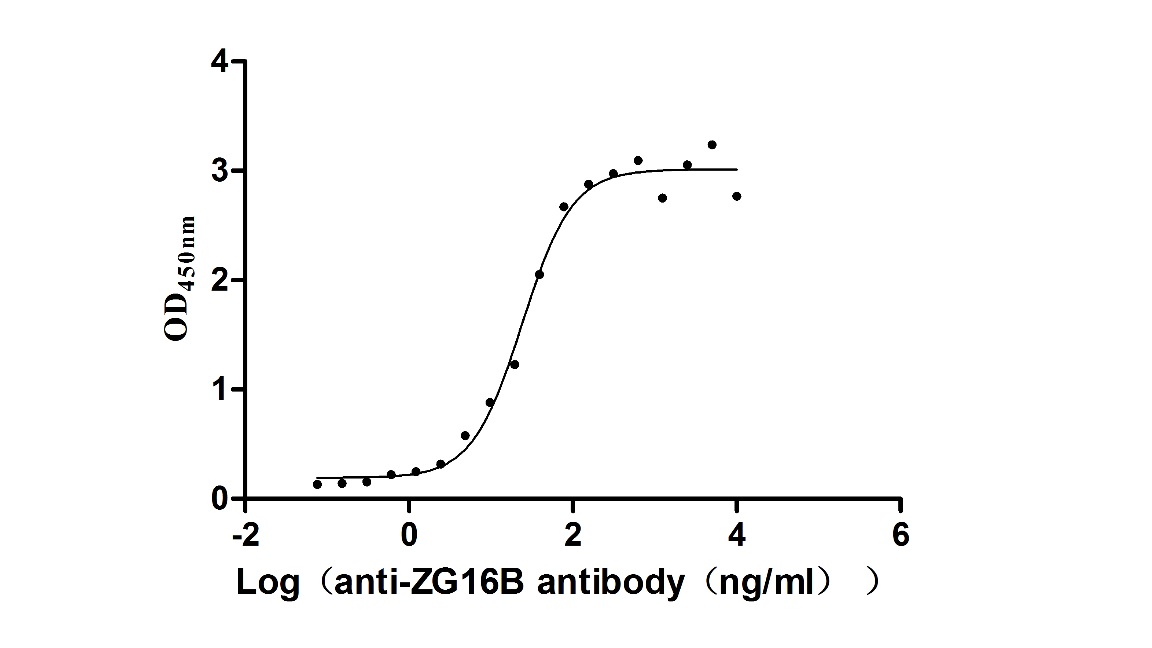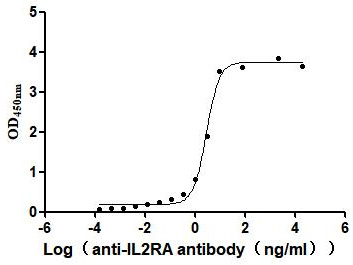Recombinant Mouse Apolipoprotein A-I (Apoa1)
In Stock-
货号:CSB-EP001913MO
-
规格:¥1536
-
图片:
-
其他:
产品详情
-
纯度:Greater than 90% as determined by SDS-PAGE.
-
基因名:
-
Uniprot No.:
-
种属:Mus musculus (Mouse)
-
蛋白长度:Full Length of Mature Protein
-
来源:E.coli
-
分子量:35.7 kDa
-
表达区域:19-264aa
-
氨基酸序列WHVWQQDEPQSQWDKVKDFANVYVDAVKDSGRDYVSQFESSSLGQQLNLNLLENWDTLGSTVSQLQERLGPLTRDFWDNLEKETDWVRQEMNKDLEEVKQKVQPYLDEFQKKWKEDVELYRQKVAPLGAELQESARQKLQELQGRLSPVAEEFRDRMRTHVDSLRTQLAPHSEQMRESLAQRLAELKSNPTLNEYHTRAKTHLKTLGEKARPALEDLRHSLMPMLETLKTQVQSVIDKASETLTAQ
Note: The complete sequence including tag sequence, target protein sequence and linker sequence could be provided upon request. -
蛋白标签:C-terminal 6xHis-tagged
-
产品提供形式:Liquid or Lyophilized powder
Note: We will preferentially ship the format that we have in stock, however, if you have any special requirement for the format, please remark your requirement when placing the order, we will prepare according to your demand. -
缓冲液:If the delivery form is liquid, the default storage buffer is Tris/PBS-based buffer, 5%-50% glycerol. If the delivery form is lyophilized powder, the buffer before lyophilization is Tris/PBS-based buffer, 6% Trehalose.
-
复溶:We recommend that this vial be briefly centrifuged prior to opening to bring the contents to the bottom. Please reconstitute protein in deionized sterile water to a concentration of 0.1-1.0 mg/mL.We recommend to add 5-50% of glycerol (final concentration) and aliquot for long-term storage at -20℃/-80℃. Our default final concentration of glycerol is 50%. Customers could use it as reference.
-
储存条件:Store at -20°C/-80°C upon receipt, aliquoting is necessary for mutiple use. Avoid repeated freeze-thaw cycles.
-
保质期:The shelf life is related to many factors, storage state, buffer ingredients, storage temperature and the stability of the protein itself.
Generally, the shelf life of liquid form is 6 months at -20°C/-80°C. The shelf life of lyophilized form is 12 months at -20°C/-80°C. -
货期:3-7 business days
-
注意事项:Repeated freezing and thawing is not recommended. Store working aliquots at 4°C for up to one week.
-
Datasheet & COA:Please contact us to get it.
相关产品
靶点详情
-
功能:Participates in the reverse transport of cholesterol from tissues to the liver for excretion by promoting cholesterol efflux from tissues and by acting as a cofactor for the lecithin cholesterol acyltransferase (LCAT). As part of the SPAP complex, activates spermatozoa motility.
-
基因功能参考文献:
- Altered intestinal lymphatic HDL-ApoA-I and miR-223 metabolism in IR and modulation by niacin may provide insight into the intestinal-mediated regulation of the reverse cholesterol transport pathway PMID: 29183962
- We developed a chimaeric molecule termed Fibapo in which FGF19 is covalently coupled to apolipoprotein A-I. Fibapo retains FGF19 biological activities but has significantly increased half-life and hepatotropism. Here we evaluated the pro-regenerative activity of Fibapo in two clinically relevant models where liver regeneration may be impaired: acetaminophen (APAP) poisoning, and PH in aged mice. PMID: 28981086
- this study indicates that ionic interactions in the C-terminal domain of apoA-I favor self-association and that monomeric apoA-I is more active in solubilizing phospholipid bilayers. PMID: 29578333
- These results suggested that apoA-I overexpression could reduce steatosis by decreasing lipid levels and by suppressing endoplasmic reticulum stress and lipogenesis in hepatocytes. ApoA-I expression could significantly reduce hepatic ER stress and lipogenesis in hepatocytes. PMID: 28577569
- ABCA1-derived nascent high-density lipoprotein-apolipoprotein AI and lipids metabolically segregate. PMID: 29074589
- apoA-I/ABCA1-mediated cholesterol efflux without STAT3 activation can reduce proinflammatory cytokine expression in macrophages. PMID: 26989082
- a novel protective role for ApoA-I in colitis and CAC PMID: 26279300
- Our results assign a novel role for 4F(apoA-I mimetic peptide ) as a modulator of the TICE pathway and suggest that the anti-inflammatory functions of 4F may be a partial consequence of the codependent intestinal transport of both 4F and cholesterol. PMID: 27199144
- Preincubation of endothelial cells with apoA-I protected against the TNF-alpha-induced inhibition of HTR-8/SVneo (trophoblast) cell integration into endothelial (UtMVEC) networks. These data suggest that a healthy lipid profile may affect pregnancy outcomes by priming endothelial cells in preparation for trophoblast invasion. PMID: 27806983
- Reductions in Dio1 expression reduce the expression of ApoA-I in a 3,5,3'-triiodothyronine-/thyroid hormone response element-independent manner. PMID: 27150392
- apoA-1 deficiency generates changes in the bone cell precursor population that increase adipoblast, and decrease osteoblast production resulting in reduced bone mass and impaired bone quality PMID: 27088511
- This study suggests that enhancement of macrophage cholesterol metabolism by PPARgammais not contributed by activating ABCA1 expression and ABCA1-mediated cholesterol efflux to apoAI, which is not involved by CD36 expression either. PMID: 27890613
- Mass spectrometry analysis of peptides derived from chemically crosslinked HDL-SAA particles detected multiple crosslinks between apoA1 and SAA, indicating close proximity (within 25 A) of these two proteins on the HDL surface, providing a molecular and structural mechanism for the simultaneous binding of heparin to apoA1 and SAA. PMID: 27105909
- results demonstrate that double deletion of Apoe and Apoa1 ameliorated the amyloid pathology. PMID: 26510953
- study suggests that apolipoprotein a1 can alleviate obesity related metabolic disease by inducing AMPK dependent mitochondrial biogenesis. PMID: 25982508
- ApoA-I can attenuate lymphocyte activation and autoimmunity in Lupus independently of cholesterol transport, through oxidized fatty acid peroxisome proliferator-activated receptor gamma ligands, and it can reduce renal inflammation in glomerulonephritis. PMID: 26466956
- KLF14 regulates plasma HDL-C levels and cholesterol efflux capacity by modulating hepatic ApoA-I production. PMID: 26368306
- Akt, through its downstream targets, mTORC1 and hence autophagy, negatively regulates cholesterol efflux to apoA-I. PMID: 25415591
- macrophage apoAI expression protects against atherosclerosis and dermatitis by reducing cholesterol accumulation and regulating CD4(+) T-cell levels, without affecting serum HDL or tissue macrophage levels. PMID: 25593328
- HDL from apoA1 transgenic mice expressing the 4WF isoform is resistant to oxidative loss of function. PMID: 25561462
- ApoA1 levels were not associated with AngII-induced abdominal aortic aneurysms in mice. PMID: 26044581
- decreased ApoAI synthesis might be accounted for the lower plasma HDL level in ApoCIII transgenic mice PMID: 25969427
- MMP-8-deficient mice had significantly lower serum triglyceride (TG) levels (P = 0.003) and larger HDL particles compared with wild-type (WT) mice. However, no differences were observed in the apoA-I levels. PMID: 25550459
- Neutrophil recruitment and the neutrophil cytokines, CXCL1/CXCL2, were suppressed in apo(a)transgenic mice in the abdominal aortic aneurysm model. PMID: 24650562
- Expression of apoA-I or ABCA1 can reduce steatosis by decreasing lipid storage in hepatocytes through lipid transport and may also reduce endoplasmic reticulum stress, further lessening hepatic steatosis PMID: 24219083
- Data from studies in knockout mice suggest that low apoA1 (and thus low HDL) decreases coenzyme Q10 pool, which in turn decreases electron transfer from electron transport complexes II/III in myocardium mitochondria. PMID: 24759932
- role of the hydrophobic residues 225-230 of apoA-I for the biogenesis of HDL PMID: 24123812
- the alteration of the hydrophobic 218-222 residues of apoA-I disrupts apoA-I/ABCA1 interactions and promotes the generation of defective pre-beta particles that fail to mature into alpha-HDL subpopulations PMID: 23990662
- study identifies a previously unknown proteolytic activity of PLA2 that is specific to apoA-I and may contribute to the enhanced catabolism of apoA-I in inflammation and atherosclerosis. PMID: 24523407
- Myeloperoxidase-mediated oxidation renders ApoA-I dysfunctional and unable to promote reverse cholesterol transport, mediate beneficial changes in the composition of atherosclerotic plaques, and pacify the inflammatory status of plaque macrophages. PMID: 24407029
- DYRK1A overexpression decreases plasma lecithin:cholesterol acyltransferase activity and apolipoprotein A-I levels. PMID: 23920041
- In the C57BL/6 context, but not FVB/N, apoA-I decreases inflammatory macrophage recruitment and monocytosis, contributors to lesion formation PMID: 24334873
- ApoA1 enhances resolution of allergen-induced airway inflammation through promoting recovery of damaged TJs in the bronchial epithelium. PMID: 23889245
- This study reveals a potent immunomodulatory role for apoA1 in the tumor microenvironment. PMID: 23720750
- ApoA-I Helsinki promotes accumulation of ACAT1 in a mouse macrophage cell line. PMID: 23456478
- Data indicate that in contrast to apoA-I-knock-out (KO) mice, apoA-I transgenic mice were moderately resistant to cecal ligation and puncture (CLP)-induced septic death. PMID: 23658016
- Apo (a) could attenuate the adhesion, migration, and homing abilities of endothelial progenitor cells(EPCs) and could impair the angiogenesis ability of EPCs. PMID: 23581552
- Hepatocyte-specific Dyrk1a gene transfer rescues plasma apolipoprotein A-I levels and aortic Akt/GSK3 pathways in hyperhomocysteinemic mice. PMID: 23429073
- Genome-wide screen for modulation of hepatic apolipoprotein A-I (ApoA-I) secretion. PMID: 23322769
- Mouse apoA-I, which has a relatively polar C-terminal domain, binds to human high-density lipoprotein to approximately half the level of human apoA-I. PMID: 23425306
- the involvement of apoA-I in diet-induced The accumulation of triglycerides in hepatocytes and its potential role in the treatment of nonalcoholic fatty liver disease, is reported. PMID: 22576368
- Reduced biliary sterol output with no change in total faecal excretion was found in mice expressing a human apolipoprotein A-I variant. PMID: 22845860
- A de novo, loss-of-function mutation in the ApoA1 gene of the BcA68 strain prematurely truncates the ApoA1 protein and is associated with a deviant HDLc plasma level. PMID: 22805347
- OVA-challenged apoA-I(-/-) mice exhibited a phenotype of increased airway neutrophils compared with WT mice. PMID: 22427535
- fed pregnant mice, with or without a deficiency of Mthfr, choline-deficient diets and examined levels of ApoAI, PPARalpha, IFNgamma, and IL-10. ApoAI mRNA was reduced in Mthfr(+/-) and ApoAI protein was reduced due to Mthfr deficiency or choline deficiency. PMID: 22259189
- naturally occuring polymorphisms significantly alter the protein self-association properties, the ability of the proteins to clear lipid micelles from solution, and their binding affinity for mature mouse HDL PMID: 22402133
- The FGF19 effect on APOA was attenuated by transfection of primary hepatocytes with siRNA against the FGF19 receptor 4 (FGFR4). PMID: 22267484
- Data show that cells expressing Cav1 have 2.6-fold more apoA-I binding sites than Cav1(-/-) cells although these additional binding sites are not associated with detergent-free lipid rafts. PMID: 21858084
- the role of the PCPE2 protein in an in vivo model PMID: 21771977
- analysis of reverse cholesterol transport key players and rescue from global inflammation by ApoA-I(Milano) PMID: 19120689
收起更多
-
亚细胞定位:Secreted.
-
蛋白家族:Apolipoprotein A1/A4/E family
-
组织特异性:Major protein of plasma HDL, also found in chylomicrons.
-
数据库链接:










-AC1.jpg)









